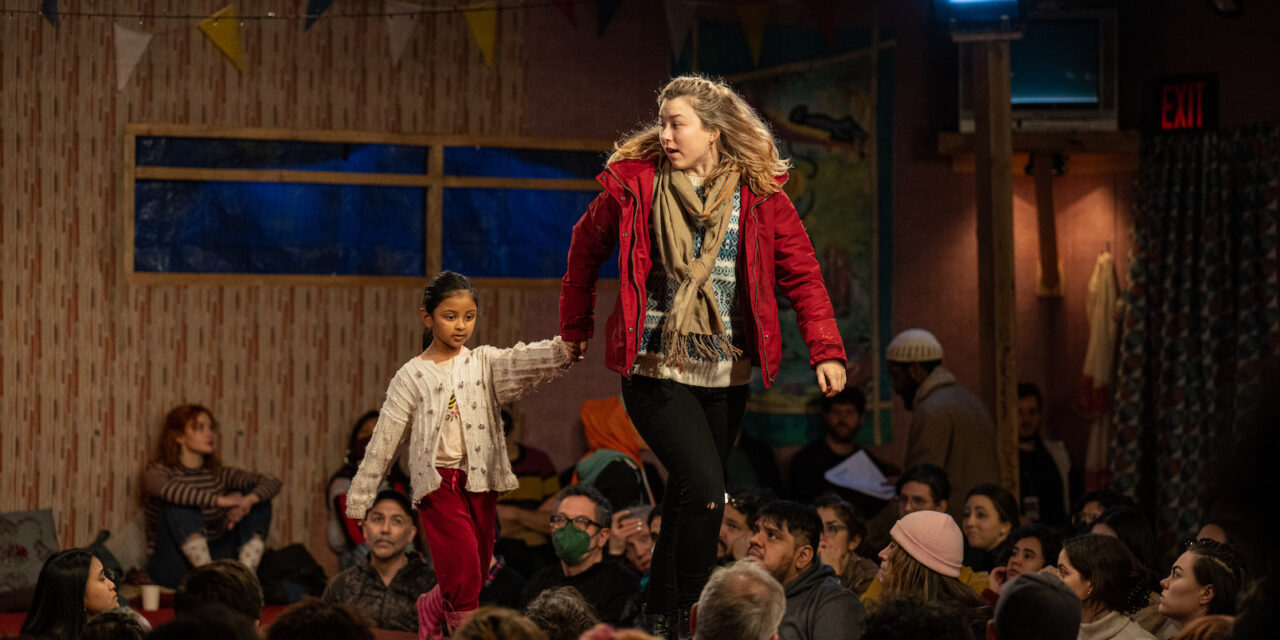By JK Clarke . . .
Good theater entertains. Great theater enlightens, educates and illuminates. The very entertaining, The Jungle (a Good Chance Theatre/National Theatre/Young Vic import from the UK playing once again after a brief run in 2018-19, at St. Ann’s Warehouse through March 19) does all of these things more thoughtfully and creatively than any production you’ve seen in many, many years.
What The Jungle does is immerse the audience in a facsimile of a refugee camp in Calais, France that formed (in 2015) after a massive migration of desperate families and individuals fleeing war, famine, ISIS and socio-political oppression in the form of grotesque human rights violations in many nations of Africa and the Middle East (Sudan, Syria, Iraq, Eritrea, Darfur, Afghanistan, Kurdistan, to name but a few). Writers Joe Murphy and Joe Robertson, who spent seven months in the camp in Calais running a theater for and with its residents, know whereof they speak. And their vision is brought to life by celebrated directors Justin Martin (Netflix’s “The Crown”) and Tony-winner Stephen Daldry (Billy Elliot), along with their stellar creative team.
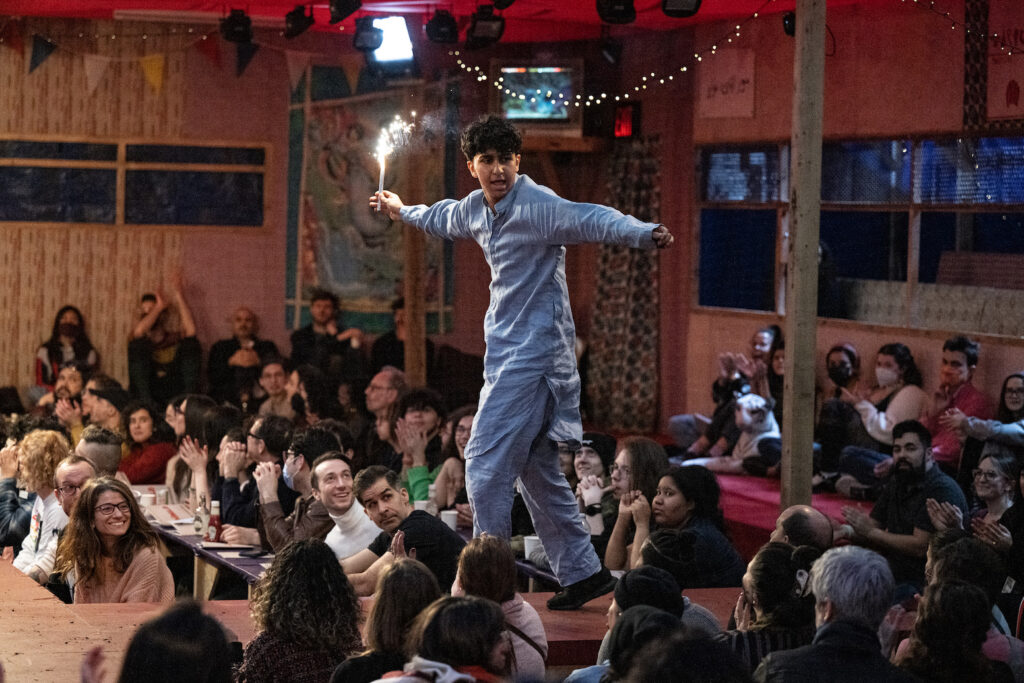
Calais, a port city in northern France, is a mere 22 miles (that might as well be a thousand) from England, across the English Channel, where political asylum is available to all who can make their way in. The play’s chorus/omniscient voice is a melancholy and compassionate Syrian named Safi (the absolutely outstanding Ammar Haj Ahmad) who tells us : “On a good day, you can just about see the White Cliffs of Dover. But today is not a good day.”
We’ve all seen video—and are shown again via monitors throughout the performance space—of not only the young Syrian boy in a red shirt and sky blue shorts, dead on a Mediterranean beach; but also of migrants running after massive transport trucks, clambering on to their bumpers, hoping to catch a ride to England. It’s straight out of “The Walking Dead,” a zombie apocalypse scenario with people emotionally cleaved by unspeakable horrors desperately risking life and limb just to survive. These are the humans escaping to, and leaving from, this port in Calais, perched between a noisy highway (which we hear roaring in our ears pre-show) and putrid landfill.
The French and English governments, however, are doing everything they can to keep the multinational citizens of The Jungle from crossing over.
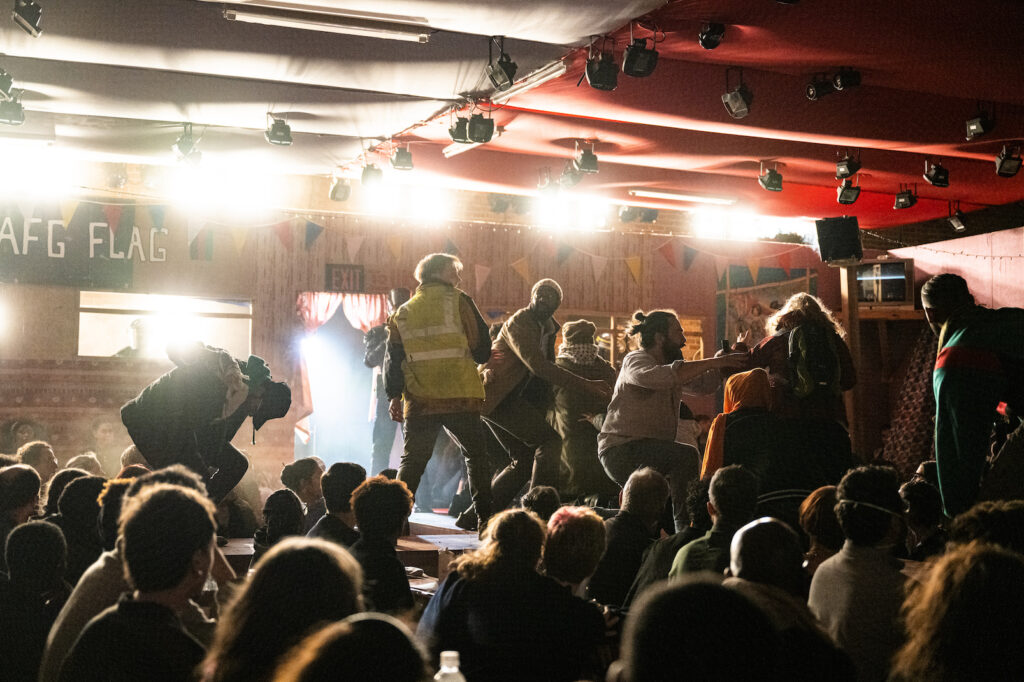

The Jungle is very immersive theater, with the audience sitting in the camp canteen (which they get to by passing through tunnels in cardboard shanties, emblazoned with signs pointing to Afghanistan, Sudan, or Kurdistan, and so on) among those very desperate souls who, realizing they will be mired in Calais for months or years to come, are doing their best to create a sustainable, equitable and orderly society, despite their desire to leave at the first opportunity. The canteen houses a restaurant presided over by a Peshawari man, Salar (a passionate and intense Ben Turner), whose food is so good it merits a glowing, four star review by the Times of London’s celebrated food critic, AA Gill (this really happened!).
Just above us, as we sit on cafeteria-style benches, the play takes place on long rectangular tables, intersecting at right angles like streets in a small town. Sometimes we are dangerously close to flips, fighting or passing bicycles; and we are mere feet away from both moments of compassion (as when a young child is whisked to permanent safety by one of the English volunteers) and terror (the French police roar through the camp in tanks and riot gear, klieg lights blinding us as we turn to face the source of multiple explosions and, shockingly, watch the roof of our tent lift up as if mashed by the tractors outside). Tony-nominated set designer Miriam Buether’s astonishingly precise, realistic work (right down to the dirt floors) along with Lighting Designer Jon Clark and Sound Designer Paul Arditti should be receiving every possible industry award for their remarkable triumph of sound, light and space.
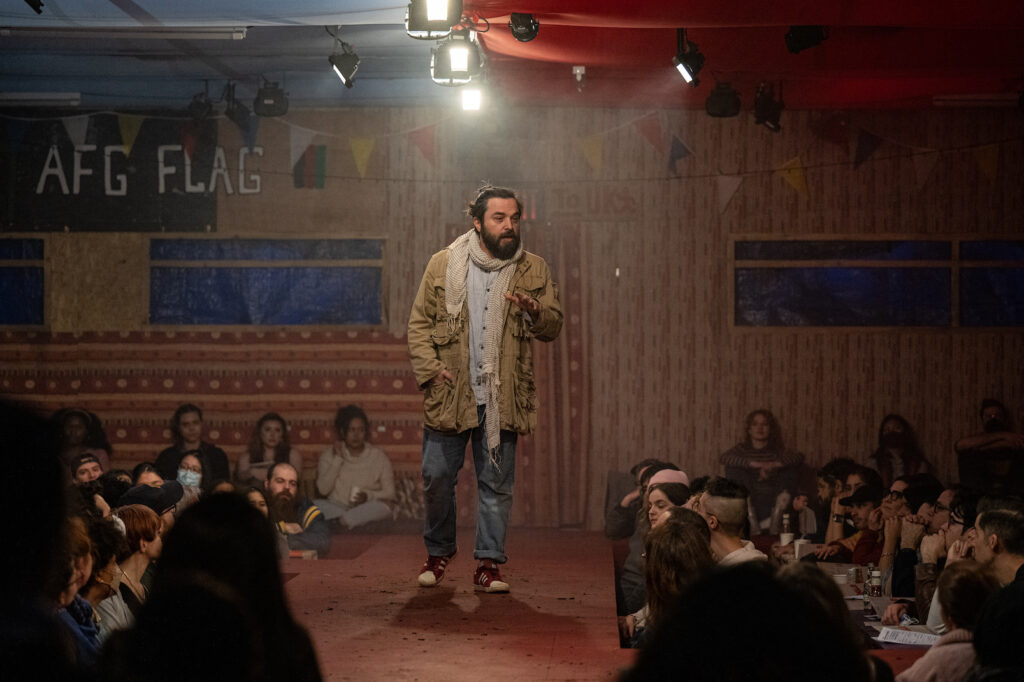

The play begins in the story’s climactic scene, when a teen Afghani boy, Norullah (the very gifted Twana Omer) has gone missing as residents wait for word from a French court about whether the camp will be torn down by government forces. Tensions are high. Those who can are fleeing, including the hilarious and sad bon vivant volunteer, Boxer, a sot seeking his own refuge from his broken family in Newcastle with a barely intelligible Geordie accent—brilliantly and touchingly played by Pearce Quigley (ITV’s “The Detectorists”). We then go back to the beginning of the story that led to this intense moment of theater.
The play is about a coming together of refugees from nations so culturally estranged that tensions erupt routinely (little spats between Eritrean Christians and Syrian Muslims are the least of the potential problems); they’re joined by a passel of well-meaning, but often naive, volunteers from England, driven by guilt at their government’s unwillingness to help solve the crisis. There’s a point early in The Jungle when a young English volunteer, Beth (a wonderful Liv Hill) discusses a recent magazine article: “When people share opinions or petitions or crowdfunders online, he says all you’re really doing is signaling your virtue. You’re not actually doing anything.” The term “virtue-signaling” is now not only ubiquitous, but routinely employed against empathetic progressives like a sledgehammer. The idea is basically a fancy way of calling out “concern” for disadvantaged persons as bleeding-heart lip service. This is the play’s clever way of letting us know that it treads dangerously close to this infraction, but doesn’t wish or intend to. Unless you think thorough story-telling falls under those auspices—it doesn’t—you shouldn’t be bothered by the notion.
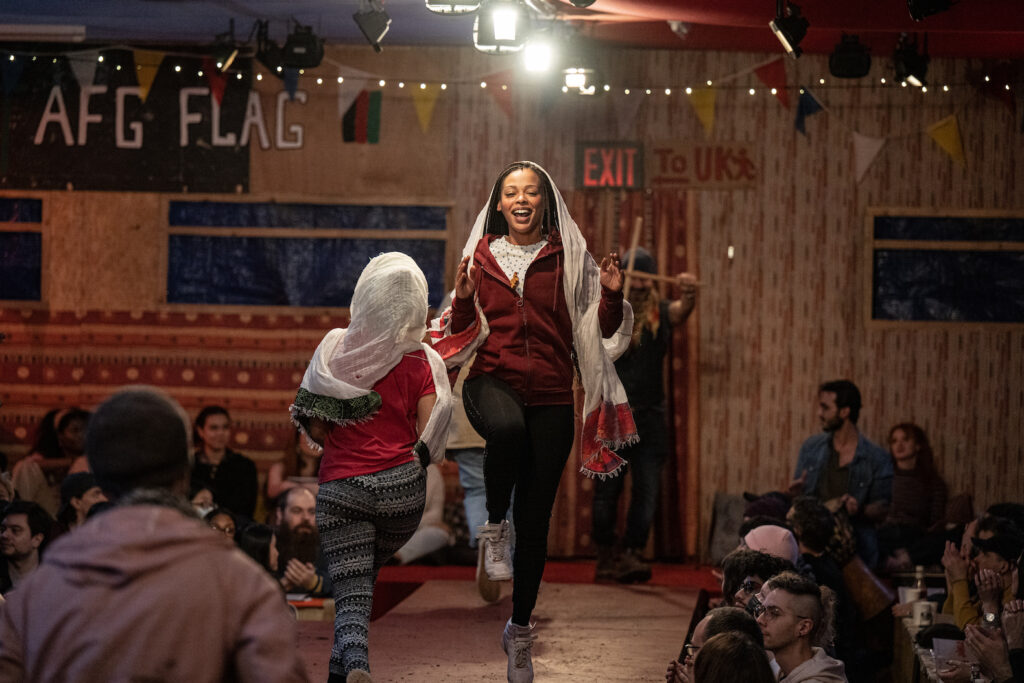

But the English volunteers do blunder. When Safi explains the camp’s adoptive name, “Zhangal. A Pashto word, which means forest,” the well-meaning English hear “Jungle,” and the more heavily-loaded word ends up sticking, though no one really seems to mind because there’s some truth in this new, less attractive, anglicized moniker. It’s certainly more appealing than the French “bidonville,” as employed by a federal judge, a slightly uglier word than its English equivalent, “shantytown.”
And that’s the spirit of the Jungle. Though there is desperate hardship, government oppression (where no one expected to encounter it, in quasi-socialist France), rough conditions and hunger, there is also laughter, joy, dancing, singing, English lessons, deep compassion and . . . theater!
The Jungle’s power comes from putting very different human faces—kind, sympathetic, believable and admirable—on a complex and heartbreaking humanitarian crisis. This is important theater. It is unmissable theater. It is theater whose run should not end so soon. But it will. Go see it—because not only is it extremely important to witness, it is completely and utterly entertaining, as great theater should be.
The Jungle. Through March 19 at St. Ann’s Warehouse (45 Water Street, DUMBO, Brooklyn). Two hours, 45 minute with one intermission. www.stannswarehouse.org
Photos: Teddy Wolff


